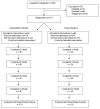Effects of coping skills training in school-age children with type 1 diabetes
- PMID: 19488997
- PMCID: PMC2720049
- DOI: 10.1002/nur.20336
Effects of coping skills training in school-age children with type 1 diabetes
Abstract
Children with type 1 diabetes are at risk for negative psychosocial and physiological outcomes, particularly as they enter adolescence. The purpose of this randomized trial (n = 82) was to determine the effects, mediators, and moderators of a coping skills training intervention (n = 53) for school-aged children compared to general diabetes education (n = 29). Both groups improved over time, reporting lower impact of diabetes, better coping with diabetes, better diabetes self-efficacy, fewer depressive symptoms, and less parental control. Treatment modality (pump vs. injections) moderated intervention efficacy on select outcomes. Findings suggest that group-based interventions may be beneficial for this age group.
Copyright 2009 Wiley Periodicals, Inc.
Figures
References
-
- American Diabetes Association. Standards of medical care in diabetes. Diabetes Care. 2005;28(Suppl 1):s4–s36. - PubMed
-
- Anderson BJ, Auslander WF, Jung KC, Miller JP, Santiago JV. Assessing family sharing of diabetes responsibilities. Journal of Pediatric Psychology. 1990;15:477–492. - PubMed
-
- Anderson BJ, Brackett J, Ho J, Laffel LM. An office-based intervention to maintain parent-adolescent teamwork in diabetes management. Impact on parent involvement, family conflict, and subsequent glycemic control. Diabetes Care. 1999;22:713–721. - PubMed
-
- Anderson BJ, Ho J, Brackett J, Finkelstein D, Laffel LM. Parental involvement in diabetes management tasks: Relationships to blood glucose monitoring adherence and metabolic control in young adolescents with insulin-dependent diabetes mellitus. Journal of Pediatrics. 1997;130:257–265. - PubMed
Publication types
MeSH terms
Grants and funding
LinkOut - more resources
Full Text Sources
Medical


